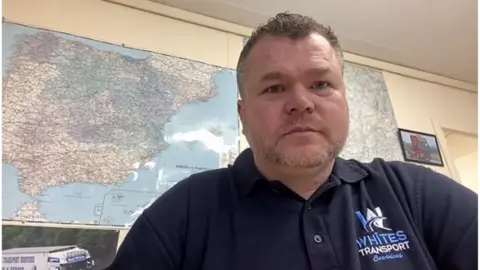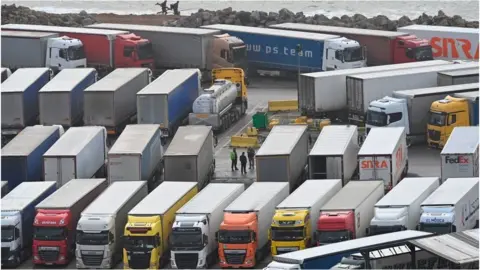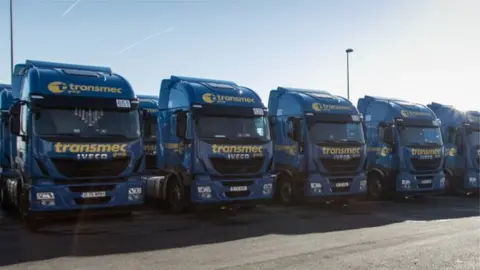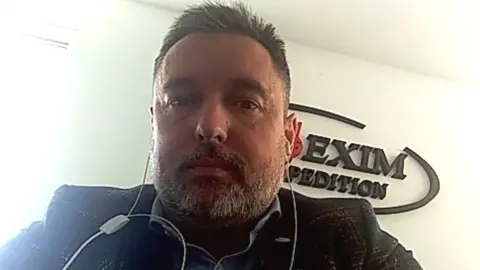Brexit: 'Most difficult week I've had in this job in 20 years'
 Pete White
Pete WhiteOver a week on from the end of the Brexit transition period some hauliers say they have faced long delays.
They fear it will get worse before it gets better.
"Last week was probably the most difficult week I've had in this job in 20 years," says Pete White, transport manager at Whites Transport Services. "It's been sleepless nights and a lot of stress."
Whites Transport Services has been moving British meat across the EU since 1992.
The deal with the EU requires their goods to have accompanying paperwork including health certificates. Mr White says that the company had dealt with customs procedures before and had prepared, but that the delays involved have disrupted the business.
"We've had some horror stories of trucks that have had to go back hundreds of miles from where they started because the seal was incorrect, or the paperwork was wrong.
"We've had issues when we've been refused entry, but the paperwork is right.
 Getty Images
Getty Images"In just over a week, we have lost hundreds of hours, dozens of days already with our trucks waiting unnecessarily.
"I think it's going to get worse before it gets better."
He says that so far the company has managed to clear all of its goods into Europe, although often with heavy delays.
Traffic leaving Great Britain to travel to the EU has been quieter than usual, with an average of 2,500 lorries a day from the port of Dover. Many companies took the decision to stock up before the end of the transition period, but traffic is expected to increase later in January.
"Hauliers may come across different issues as they try to move their goods, but the overarching difficulty is that the system now has inbuilt bureaucracy," says Rod McKenzie, policy director at the Road Haulage Association.
"Customs agents are swamped with work and struggling to process people's forms for exports. The volumes are currently down, but some are already finding the system a real strain."
 Transmec Group
Transmec GroupWhites is not the only haulier to have experienced delays.
John Simkins, general manager of Transmec UK Ltd, felt so strongly that he wrote to his local MP about the problems.
'It all adds time'
"This is the first week of the new year which is usually quiet, but the systems already cannot cope. We have 10 people on the team dealing with this, all of them are exhausted after a week.
"I have worked in the industry for 40 years and can remember the customs processes before we joined the common market, but the current situation is worse."
"Before taking goods to Milan was similar to taking goods to Manchester, the only difference was the distance. Now our lorries have to stop at customs on their way out and again when they reach Italy. It all adds time.
"Some of the problems we've seen will be teething problems and we are all learning every day, but ultimately there's now an enormous layer of bureaucracy on both sides of the channel that wasn't there before and that won't go away."
 Transmec Group
Transmec GroupNot all of the issues the firm has faced are related to the new relationship with the EU.
When France initially closed its border for 48 hours in a ramping up of coronavirus containment measures, thousands of lorry drivers were left parked up for several days, sleeping in their vehicles without any bathroom facilities.
France has toughened the rules again. From Monday, the French government has said it will no longer accept lateral flow Covid tests for those travelling from the UK to France, requiring PCR tests which take longer to give results.
But the French Transport Minister, Jean-Baptiste Djebbari, tweeted that hauliers are exempt from this, "pending a co-ordinated approach between European countries".
Speaking on BBC Breakfast,UK Transport Minister Grant Shapps confirmed lateral flow tests could still be used for hauliers, but acknowledged that if this changed it could cause problems.
Shortage of drivers
Mr Simkins thinks the previous restrictions had a knock-on effect on those willing to make the journey to the UK.
"In the first week of January, we couldn't find a single European sub-contractor prepared to come to the UK," he said.
"They are paid by the kilometre so if they are stuck in a queue they lose money. It's not just the stories about what happened before Christmas, but also because lorries don't know how quickly they will be able to turn around once they have dropped their goods.
"We are already reviewing our prices because we can't get the volume of work we need from our drivers. There was a shortage of them before, but this has made it worse."
Data from some logistics companies suggests that prices for EU to Great Britain trips have already risen. Transporeon, a company that connects carriers to shippers, say they have seen spot rates - prices for on-the-spot bookings rather than long-term contracts - increase by 39% from France to Great Britain and 26% from Germany to GB.
 George Suteu
George SuteuGeorge Suteu, the manager of Agexim, a haulier company in Romania, says 40 of his drivers were stuck in the UK after the border with France closed.
Although the drivers are paid by the day rather than by distance, some have asked not to drive to the UK for now.
"We are losing money every day and the drivers are losing their patience," he says.
"The issue isn't on our side, but our customers still don't know how to complete the paperwork. A lorry might be booked to be loaded at 10am, but because the paperwork isn't ready that is delayed until 3pm, then to the next day. It leaves the driver waiting."
Long term, he also thinks it will affect his prices.
"In the first week I managed to do half of the mileage I had budgeted for. That's half the money too.
"Waiting affects the haulier. I have to transfer the majority of my cost to the client. I'm waiting to see what happens in the next two to three weeks to see how it goes. I don't buy my trucks just to park them up."
A government spokesperson said: "Now the UK has left the EU customs union and Single Market, there are new rules and processes businesses will need to follow. Any business unsure about what they need to do should visit GOV.UK, attend one of our free webinars or watch one of our short films about importing and exporting.
"The government will continue to work closely with businesses to ensure they are able to trade effectively under the new rules."
